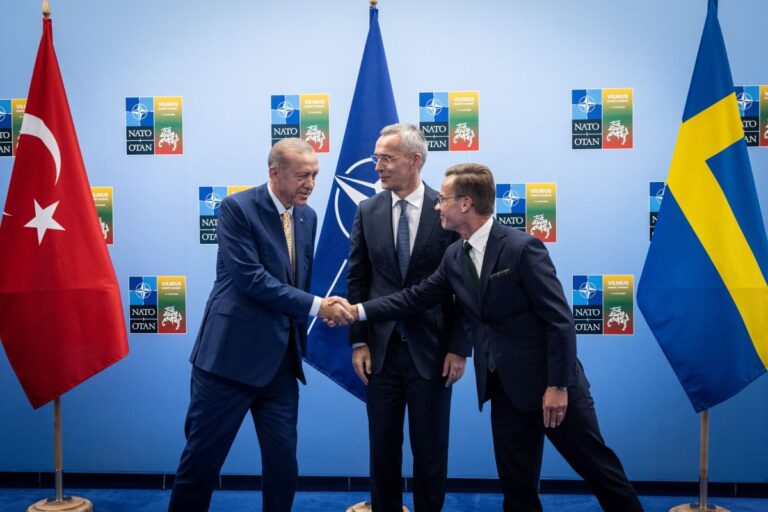Jens Stoltenberg, NATO Secretary General, on the eve of the Alliance summ in Vilnius, made the announcement that an understanding had been reached between Turkey and Sweden. Turkish President Recep Erdogan had given the green light for the Scandinavian country to join the Atlantic alliance.
Here are the salient points of the agreement. Bearing in mind that the final green light must now be given by the Turkish parliament at a forthcoming session. President Erdogan has pledged to transmit the papers to parliament ‘as soon as possible’. This, to allow for a speedy ratification of Stockholm’s entry into NATO.
Table of Contents
Nato alliance expands to Sweden, the reasons for the conflict with Turkey
Before analysing what the agreement that gave the go-ahead for Sweden’s imminent entry into NATO provides for, it is necessary to take a step back and assess the reasons that until now had led Erdogan to oppose Stockholm’s entry into the Atlantic alliance.
In fact, the reasons are related to issues of what for Turkey is international terrorism. That is, reasons for the Turkish government’s coldness to Sweden’s entry into NATO is Sweden’s alleged leniency, is Ankara’s accusation, towards Kurdish militants who found refuge on Swedish soil. Ankara demanded from Sweden a decisive distance from terrorism and the extradition of some suspected militants.
What the agreement between Turkey and Sweden for Stockholm’s entry into NATO envisages
In fact, the agreement provides a joint commitment to fight terrorism, arms, and even support from Sweden for Turkey’s entry into the European Union.
On the eve of the Vilnius summit of the Atlantic alliance, the removal of the Turkish veto on Stockholm’s entry into NATO came at the trilateral meeting promoted by Secretary General Jens Stoltenberg on these pivotal points.
The agreement stipulates that NATO will create a counter-terrorism coordinator. And that Sweden will implement the agreements on the removal of restrictions on arms exports to Ankara. Sweden, for its part, will undertake to support Turkey’s EU accession process as a member state.
The key part that opens the Sweden-Turkey agreement
The initialled agreement reads as follows:
Since the last NATO summit, Sweden and Turkey have worked closely together to address Turkey’s legitimate security concerns. As part of this process, Sweden has amended its constitution, changed its laws, significantly expanded counter-terrorism cooperation against the PKK, and resumed arms exports to Turkey, all steps stipulated in the Trilateral Memorandum agreed in 2022.
“Sweden and Turkey,” the understanding explains, “have agreed to continue their cooperation both within the framework of the Permanent Joint Trilateral Mechanism established at the Nato Summit in Madrid in 2022. And within the framework of a new Bilateral Security Pact that will meet annually at ministerial level and create working groups as needed.
Understanding extended also on the economic and political level
“Sweden and Turkey have also agreed to intensify economic cooperation, through the Turkey-Sweden Joint Economic and Trade Committee. Both Turkey and Sweden will seek to maximise opportunities for increased bilateral trade and investment’.
Stockholm will also actively support efforts to reinvigorate Turkey’s EU accession process. Including the modernisation of the EU-Turkey Customs Union and visa liberalisation.
Erdogan’s Turkey, who recently won the ballot and was confirmed for a new term at the helm of the country, was granted the EU candidate status in December 1999. However, negotiations have been at a standstill since June 2018. THis is due to the continued regression in the areas of democracy, rule of law and fundamental rights.












